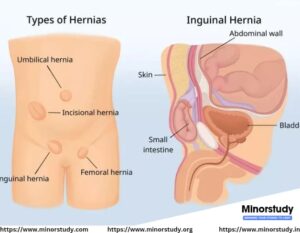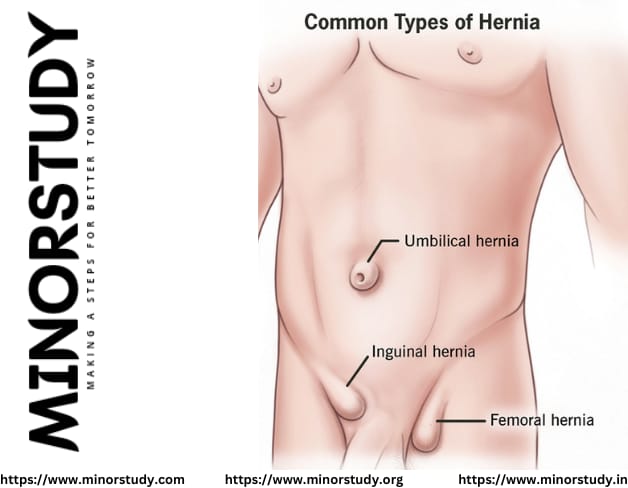🩺 Introduction: What is a Hernia?
A hernia is a medical condition that occurs when an internal organ or tissue pushes through a weak spot in a muscle or surrounding connective tissue, often in the abdominal wall. While it might sound minor, untreated hernias can lead to life-threatening complications. Millions suffer from hernias worldwide, but awareness about its seriousness, signs, and prevention remains shockingly low.
- 🧠 History of Hernia: A Condition As Old As Humanity
- 📌 Types of Hernias: Know the Difference
- 📊 Facts and Statistics About Hernia
- 🕰️ Timeline: Evolution of Hernia Awareness and Treatment
- ❓ Frequently Asked Questions (FAQs)
- 🎯 Significance of Hernia Awareness
- 🎉 Observance: Global Hernia Awareness Month
- 💡 Important Points to Remember
- 🙏 Wishing for Strength & Awareness
- 🏠 Importance of Hernia in Our Life and Society
- 🌟 Conclusion: Daily Life Impacts & Final Words
🧠 History of Hernia: A Condition As Old As Humanity
Ancient Egypt (1500 BCE): Hernias were documented in the Ebers Papyrus, one of the oldest medical texts.
Greek Civilization: The term “hernia” comes from the Greek word hernios, meaning “a bud” or “offshoot.” Hippocrates discussed hernias and even created devices to reduce them.
Middle Ages: Treatment largely relied on trusses and herbal compresses. Surgery was rare and risky.
Modern Era (19th–20th century): Introduction of anesthesia and antiseptic techniques revolutionized hernia surgery.
21st Century: Today, hernia repairs are among the most common surgeries globally, with laparoscopic (keyhole) and robotic surgeries offering minimally invasive options.
📌 Types of Hernias: Know the Difference
| Type | Location | Common in |
|---|---|---|
| Inguinal Hernia | Groin | Men |
| Femoral Hernia | Upper thigh/groin | Women |
| Umbilical Hernia | Belly button | Newborns and obese individuals |
| Hiatal Hernia | Diaphragm | Adults, especially 50+ |
| Incisional Hernia | Past surgical site | Post-operative patients |

📊 Facts and Statistics About Hernia
Over 20 million hernia repairs are performed annually worldwide.
Inguinal hernia accounts for over 75% of all abdominal wall hernias.
Males are 8 times more likely to develop inguinal hernia than females.
1 in 3 babies born prematurely may develop umbilical hernia.
If untreated, some hernias can become strangulated, cutting off blood supply and causing death.
🕰️ Timeline: Evolution of Hernia Awareness and Treatment
| Year | Milestone |
|---|---|
| 1500 BCE | Hernias described in Egyptian medical scrolls. |
| 400 BCE | Hippocrates outlines non-surgical hernia treatments. |
| 10th Century | Arabic physician Albucasis develops surgical instruments. |
| 1880s | Use of general anesthesia makes hernia surgeries safer. |
| 1990s | Laparoscopic techniques become standard. |
| 2020s | AI-assisted and robotic hernia surgeries now available. |
❓ Frequently Asked Questions (FAQs)
Q1. Is hernia life-threatening?
Not always, but if it becomes strangulated, it can lead to serious complications or even death if not treated urgently.
Q2. Can hernia heal on its own?
No. Hernias do not go away on their own. Surgery is often the only long-term solution.
Q3. What causes hernias?
Weak muscle walls, heavy lifting, obesity, chronic coughing, pregnancy, or past surgeries.
Q4. Are hernias preventable?
Not always, but maintaining a healthy weight, avoiding heavy lifting, and treating chronic coughs can reduce risk.
Q5. How long does hernia surgery recovery take?
2–6 weeks for basic activities; longer for strenuous tasks. Laparoscopic methods have quicker recovery.
🎯 Significance of Hernia Awareness
Despite its commonality, hernia is often ignored until it becomes painful or dangerous. The lack of early awareness leads to higher treatment costs, prolonged suffering, and severe complications in many cases.
Educating people about symptoms such as:
A visible lump or bulge,
Pain when lifting or coughing,
Nausea or vomiting (in strangulated cases),
can literally save lives. Hernia awareness is not just medical—it’s societal.
🎉 Observance: Global Hernia Awareness Month
Observed in June, this initiative by health bodies like Hernia International and World Hernia Society promotes:
Free screenings
Seminars
Surgical camps in underprivileged regions
Hospitals and NGOs often use this month to spotlight both men’s and women’s health issues around hernia risks.
💡 Important Points to Remember
Early diagnosis is key.
Not all hernias are painful at first—but all need attention.
Modern surgical methods are safe and highly effective.
Recurrence rates are very low with mesh-based or robotic surgeries.
Neglecting a hernia can have long-term health and financial costs.
🙏 Wishing for Strength & Awareness
If you or someone you know is dealing with a hernia, don’t ignore it.
Let’s wish everyone:
Early diagnosis,
Safe surgery,
And complete healing.
Share awareness today to prevent complications tomorrow. A simple conversation could save someone’s life.
🏠 Importance of Hernia in Our Life and Society
📌 In Our Lives
Hernias may affect day-to-day comfort, productivity, and mobility.
Timely treatment restores physical well-being and mental peace.
For workers, especially manual laborers, it is a critical health concern.
📌 In Society
Hernia surgeries cost healthcare systems billions yearly.
Lack of awareness leads to inequities in treatment access.
NGOs play a vital role in rural and underdeveloped areas.
Promoting public health education on hernia can reduce strain on healthcare resources.
🌟 Conclusion: Daily Life Impacts & Final Words
Hernias are not just lumps in the body; they are warning signs from within.
Left unattended, they can grow from an annoyance to an emergency.
Yet, the truth is — hernias are highly treatable, especially when caught early.
✔️ Living pain-free
✔️ Returning to normal work
✔️ Avoiding surgical emergencies
…are all achievable with timely action.
So the next time you hear someone say, “It’s just a hernia,” remind them: it’s not just a bulge—it’s a call to care.








